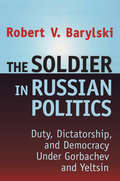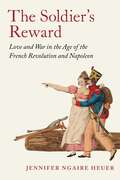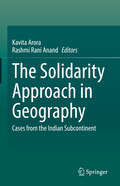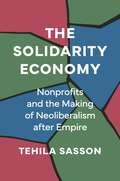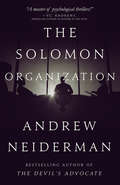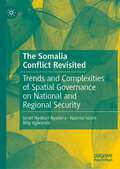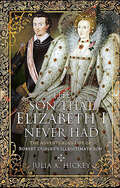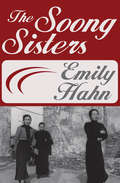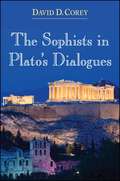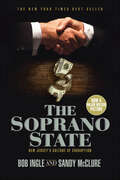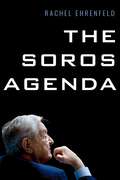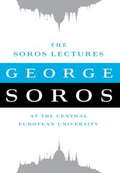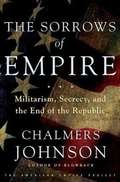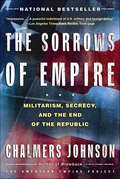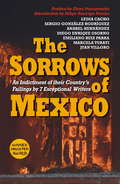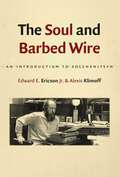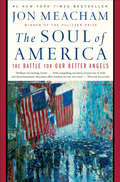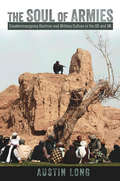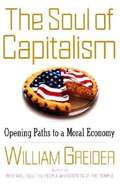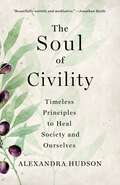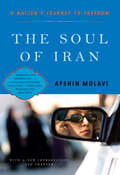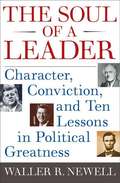- Table View
- List View
The Soldier in Russian Politics, 1985-96
by Robert BarylskiIf Russia is to become a viable democracy, it will need a viable state to make and enforce decisions that nurture societal cohesion and sustain complex economic activity. Armed forces are essential attributes of viable modern states, but what happens when states undergo major structural changes? What was the military's contribution to the end of the Soviet Union and the rise of post-Soviet Russia?The Soldier in Russian Politics is the first study to go beyond familiar accounts of the main events that brought down the Soviet state and began its reconstruction. It captures the interplay between soldier and civilian politicians in a major political history based on solid political-sociological analysis. Barylski uses the study of civil-military relations to explore new political and intellectual conditions and explain the historic relationship between changes in Western models of Russian reality and political change in the former Soviet Union.Examining the military's participation in every major, twentieth-century, political change from 1917 to 1991, Barylski demonstrates that every deep political transformation in Russia has military dimensions. Barylski discusses how the Russian presidency's power to command and control the military without legislative checks and balances led to armed conflict with Parliament in October 1993 and to the Chechen war of 1994-1996, and is unhealthy for long term democratic development. Barylski analyzes ministers of defense Yazov, Shaposhnikov, Grachev, and Rodionov as political actors, traces the careers of ambitious political soldiers such as Aleksandr Lebed and Aleksandr Rutskoi, and describes the military's growing political alienation from the Yeltsin administration. His final chapters cover the presidential elections, the short-lived Yeltsin-Lebed political alliance, the tensions associated with Yeltsin's ailments, and Yeltsin's efforts to rebuild his personal power political effectiveness.The Soldier in Russian Politics presents political history in an incisive and objective manner. It applauds the progressive officers, soldiers, and politicians where decisions minimized bloodshed and prevented civil war. But it also warns that civilian and military leaders can make mistakes which cause political institutional failure, violence, and dictatorship. This book will interest political scientists, political sociologists, students of Russian and soviet politics, and all military historians and professionals.
The Soldier's Reward: Love and War in the Age of the French Revolution and Napoleon
by Jennifer Ngaire HeuerA sweeping history of intimacy and family life in France during the age of revolutionThe French Revolution and Napoleonic Wars devastated Europe for nearly a quarter of a century. The Soldier&’s Reward recovers the stories of soldiers and their relationships to family and domestic life during this period, revealing how prolonged warfare transformed family and gender dynamics and gave rise to new kinds of citizenship.In this groundbreaking work combining social, cultural, gender, and military history, Jennifer Ngaire Heuer vividly describes how men fought for years with only fleeting moments of peace. Combatants were promised promotion, financial gain, and patriotic glory. They were also rewarded for their service by being allowed to return home to waiting families and love interests, and with marriages that were arranged and financially supported by the state. Heuer explores competing ideas of masculinity in France, as well as the experiences of the men and women who participated in such marriages. She argues that we cannot fully understand the changing nature of war and peace in this period without considering the important roles played by family, gender, and romantic entanglements.Casting new light on a turbulent era of mass mobilization and seemingly endless conflict, The Soldier&’s Reward shows how, from the Revolution through the Restoration, war, intimacy, and citizenship intersected in France in new and unexpected ways.
The Solidarity Approach in Geography: Cases from the Indian Subcontinent
by Kavita Arora Rashmi Rani AnandThis contributed volume explains the concept of solidarity and illustrates how perspectives informed by a solidarity approach can be utilized in geographic research. Geography offers a set of concepts and tools including space, place, scale, landscape, and mobility, that makes it a particularly useful lens through which to view issues of solidarity. It is distinct from other sciences in its subject matter and methodology but at the same time offers a multidisciplinary approach and transcends its disciplinary boundary. The concept of solidarity in geography is illustrated here through nearly thirty-five case chapters, all from the Indian subcontinent. Topics covered here include but are not limited to geographical approaches to solidarity in economic issues, indigenous knowledge, international relations, global geopolitics, climate change, crisis management, human health, and more.
The Solidarity Economy (Diverse Economies and Livable Worlds)
by Jean-Louis LavilleQuestioning the boundaries between politics and economics Jean-Louis Laville&’s large body of work has focused on an intellectual history of the concept of solidarity since the Industrial Revolution. In The Solidarity Economy, his most famous distillation of this work, Laville establishes how the formations of economic solidarities (unions, activism, and other forms of associationalism) reveal that the boundaries between politics and economics are porous and structured such that politics, ideally a pure expression of ethics and values, is instead integrated with economic concerns. Exploring the possibilities and long histories of association, The Solidarity Economy identifies the power of contemporary social and solidarity movements and examines the history of postcapitalist practices in which democratic demands invade the heart of the economy. The Solidarity Economy ranges in focus from workers associations in France dating back to the nineteenth century, to associations of African Americans and feminists in the United States in the late nineteenth and early twentieth centuries, to a Brazilian landless-worker coalition in the twentieth century. Studying solidarity associations over time allows us to examine how we can recombine the economic and political spheres to address dependencies and inequalities. Ultimately, The Solidarity Economy has global scope and inspiring examples of associations that deepen democracy.
The Solidarity Economy: Nonprofits and the Making of Neoliberalism after Empire
by Tehila SassonThe untold story of the role of humanitarian NGOs in building the neoliberal order after empireAfter India gained independence in 1947, Britain reinvented its role in the global economy through nongovernmental aid organizations. Utilizing existing imperial networks and colonial bureaucracy, the nonprofit sector sought an ethical capitalism, one that would equalize relationships between British consumers and Third World producers as the age of empire was ending. The Solidarity Economy examines the role of nonstate actors in the major transformations of the world economy in the postwar era, showing how British NGOs charted a path to neoliberalism in their pursuit of ethical markets.Between the 1950s and 1990s, nonprofits sought to establish an alternative to Keynesianism through their welfare and development programs. Encouraging the fair trade of commodities and goods through microfinance, consumer boycotts, and corporate social responsibility, these programs emphasized decentralization, privatization, and entrepreneurship. Tehila Sasson tells the stories of the activists, economists, politicians, and businessmen who reimagined the marketplace as a workshop for global reform. She reveals how their ideas, though commonly associated with conservative neoliberal policies, were part of a nonprofit-driven endeavor by the liberal left to envision markets as autonomous and humanizing spaces, facilitating ethical relationships beyond the impersonal realm of the state.Drawing on dozens of newly available repositories from nongovernmental, international, national, and business archives, The Solidarity Economy reconstructs the political economy of these markets—from handicrafts and sugar to tea and coffee—shedding critical light on the postimperial origins of neoliberalism.
The Solomon Organization
by Andrew NeidermanFrom the bestselling author of The Devil’s Advocate comes this “fast-moving thriller with an up-to-the-minute premise: a secret conspiracy of men” (Publishers Weekly). Scott Lester’s bitter divorce includes accusations of adultery, alcoholism, and more—and they’re all true. To keep from losing his five-year-old daughter forever, he turns to the Solomon Organization, a secret society sympathetic to the plight of men in Scott’s situation. They are on his side. They will help him. And they don’t even want his money—they only want what is best for his little girl. And what they decide is best is the worst thing Scott Lester can imagine . . . “A taut tale of horror made more horrible by its very plausibility.” —Library Journal
The Somalia Conflict Revisited: Trends and Complexities of Spatial Governance on National and Regional Security
by Nazmul Islam Israel Nyaburi Nyadera Billy AgwandaThis book aims to examine how informality of spatial governance has influenced the evolution of the conflict in Somalia and the region. It not only reopens the debate over how the irregular conflicts can transcend national boundaries, but also presents the complexities of spatial governance on national and regional security. The book examines how socio-political and identity bonds play out in spatial governance sometimes resulting to informal control of vast national territories. The book argues that such informally governed spaces increase the level of security threat vulnerability at the national and regional levels. The book therefore adds to the existing literature which has not only to be dominated by discourses on the impact of identity on the conflict but also fall short of connecting the impact of informal spatial governance on security. Examining how informality in governance in one country can impact on the security of an entire region is a key consideration in emerging peacebuilding strategies.
The Son that Elizabeth I Never Had: The Adventurous Life of Robert Dudley’s Illegitimate Son
by Julia A. HickeySir Robert Dudley, the handsome ‘base born’ son of Elizabeth I’s favourite, was born amidst scandal and intrigue. The story of his birth is one of love, royalty and broken bonds of trust. He was at Tilbury with the Earl of Leicester in 1587; four years later he was wealthy, independent and making a mark in Elizabeth’s court; he explored Trinidad, searched for the fabled gold of El Dorado and backed a voyage taking a letter from the queen to the Emperor of China. He took part in the Earl of Essex’s raid on Cadiz and was implicated in the earl’s rebellion in 1601 but what he wanted most was to prove his legitimacy. Refusing to accept the lot Fate dealt him after the death of the Queen, he abandoned his family, his home and his country never to return. He carved his own destiny in Tuscany as an engineer, courtier, shipbuilder and seafarer with the woman he loved at his side. His sea atlas, the first of its kind, was published in 1646. The Dell’Arcano del Mare took more than twelve years to write and was the culmination of a lifetime’s work. Robert Dudley, the son Elizabeth never had, is the story of a scholar, an adventurer and Elizabethan seadog that deserves to be better known.
The Sons of Molly Maguire: The Irish Roots of America's First Labor War
by Mark BulikSensational tales of true-life crime, the devastation of the Irish potato famine, the upheaval of the Civil War, and the turbulent emergence of the American labor movement are connected in a captivating exploration of the roots of the Molly Maguires. A secret society of peasant assassins in Ireland that re-emerged in Pennsylvania’s hard-coal region, the Mollies organized strikes, murdered mine bosses, and fought the Civil War draft. Their shadowy twelve-year duel with all powerful coal companies marked the beginning of class warfare in America. But little has been written about the origins of this struggle and the folk culture that informed everything about the Mollies.A rare book about the birth of the secret society, The Sons of Molly Maguire delves into the lost world of peasant Ireland to uncover the astonishing links between the folk justice of the Mollies and the folk drama of the Mummers, who performed a holiday play that always ended in a mock killing. The link not only explains much about Ireland’s Molly Maguires—where the name came from, why the killers wore women’s clothing, why they struck around holidays—but also sheds new light on the Mollies’ re-emergence in Pennsylvania.The book follows the Irish to the anthracite region, which was transformed into another Ulster by ethnic, religious, political, and economic conflicts. It charts the rise there of an Irish secret society and a particularly political form of Mummery just before the Civil War, shows why Molly violence was resurrected amid wartime strikes and conscription, and explores how the cradle of the American Mollies became a bastion of later labor activism. Combining sweeping history with an intensely local focus, The Sons of Molly Maguire is the captivating story of when, where, how, and why the first of America’s labor wars began.
The Soong Sisters
by Emily Hahn&“If the story of the Soong family were told as fiction, people would say it was fascinating but too improbable. . . . A dramatic human chronicle . . . engrossing.&” —The New York Times Book Review In the early twentieth century, few women in China were to prove so important to the rise of Chinese nationalism and liberation from tradition as the three extraordinary Soong sisters—Eling, Chingling and Mayling—who would each marry historic figures. Told with wit and verve by New Yorker correspondent Emily Hahn, a remarkable woman in her own right, the biography of the Soong sisters reveals the story of China through both World Wars. It also chronicles the changes to Shanghai as they relate to a very eccentric family that had the courage to speak out against the ruling regime. Greatly influencing the history of modern China, they interacted with their government and military to protect the lives of those who could not be heard, and appealed to the West to support China during the Japanese invasion. &“[A] first-rate reportorial job on three distinguished women.&” —Kirkus Reviews &“A spirited, well-informed book . . . a fascinating saga . . . Hahn skillfully interweaves the personal material which she has collected in abundance with some indispensable background knowledge of Chinese history.&” —The Atlantic
The Sophists in Plato's Dialogues
by David D. CoreyAre the sophists merely another group of villains in Plato's dialogues, no different than amoral rhetoricians such as Thrasymachus, Callicles, and Polus? Building on a wave of recent interest in the Greek sophists, The Sophists in Plato's Dialogues argues that, contrary to the conventional wisdom, there exist important affinities between Socrates and the sophists he engages in conversation. Both focused squarely on aretē (virtue or excellence). Both employed rhetorical techniques of refutation, revisionary myth construction, esotericism, and irony. Both engaged in similar ways of minimizing the potential friction that sometimes arises between intellectuals and the city. Perhaps the most important affinity between Socrates and the sophists, David D. Corey argues, was their mutual recognition of a basic epistemological insight—that appearances (phainomena) both physical and intellectual were vexingly unstable. Such things as justice, beauty, piety, and nobility are susceptible to radical change depending upon the angle from which they are viewed. Socrates uses the sophists and sometimes plays the role of sophist himself in order to awaken interlocutors and readers from their dogmatic slumber. This in turn generates wonder (thaumas), which, according to Socrates, is nothing other than the beginning of philosophy.
The Soprano State: New Jersey's Culture of Corruption
by Bob Ingle Sandy McClureBob Ingle and Sandy McClure New York Times bestseller The Soprano State--now a major documentary film. It's not a jokeNew Jersey leads the country in corruptionThe Soprano State details the you-couldn't-make-this-up true story of the corruption that has pervaded New Jersey politics, government, and business for the past thirty years. From Jimmy Hoffa purportedly being buried somewhere beneath the end zone in Giants Stadium, through allegations of a thoroughly corrupt medical and dental university, through Mafia influence at all levels, the Garden State might indeed be better named after the HBO mobsters.Where else would:- A state attorney general show up after police pulled over her boyfriend who was driving without a valid license?- A state senator and mayor of Newark (the same guy) spend thousands of dollars of taxpayers' money on a junket to Rio days before leaving office?- A politically connected developer hire a prostitute to tape sex acts with his own brother-in-law and then send the tape to his sister?Only in the Soprano State.
The Soros Agenda
by Rachel EhrenfeldGeorge Soros is a man with billions at his disposal and one of the most powerful networks in the world, whose motto is: "If I spend enough, I can make it right." But what is right, according to Soros?George Soros's past as a survivor of World War II is an experience he applies as his primary credential to justify meddling in the political and social affairs of countries around the world. The self-proclaimed agnostic, Soros disputes Israel's right to exist as the Jewish State but exploits the religion he was born into as a tactic to shield him from criticism. For the past four decades, Soros has been using his multibillion-dollar, political-philanthropic global network to impose his Weltanschauung on the world. By 1993, Soros was heralded as "The Man Who Broke the Bank of England." He used the praises and publicity to create a network of powerful foundations dedicated to his overriding ambition and objective to reshape the world's only constitutional democratic republic, the United States of America. By 2023 the nation's political and social landscape has changed beyond recognition. The financial speculator's enormous sums of money oiled the Democrat Party's machine that advanced his agenda that turned the American dream into a nightmare. How did he do that? Decades ago, Rachel Ehrenfeld perceptively predicted, "Unchallenged, Soros would change the political landscape of the U.S." Join her on the journey as she exposes the Orwellian lingo, schemes, and strategies Soros has been using to transform America from a thriving, law-and-order democracy into a Sorostian world.
The Soros Lectures: At the Central European University
by George SorosFive lectures George Soros recently delivered at the Central European University in Budapest - which he founded in 1991 - distill a lifetime of thinking on finance, capitalism and open society In a series of lectures delivered at the Central European University in October 2009, George Soros provided a broad overview of his thoughts on economics and politics. The lectures are the culmination of a lifetime of practical and philosophical reflection. In the first and second lecture, Soros discusses his general theory of reflexivity and its application to financial markets, providing insight into the recent financial crisis. The third and fourth lectures examine the concept of open society, which has guided Soros' global philanthropy, as well as the potential for conflict between capitalism and open society. The closing lecture focuses on the way ahead, closely examining the increasingly important economic and political role that China will play in the future. The Budapest Lectures presents these five seminal talks into one volume, which offers a condensed and highly readable summary of Soros' world view.
The Sorrows of Empire: Militarism, Secrecy and the End of the Republic
by Chalmers Johnson[From the book jacket] In the years after the Soviet Union imploded, the United States was described first as the globe's "lone superpower," then as a "reluctant sheriff," next as the "indispensable nation," and, in the wake of 9/11, as a "New Rome." Here, Chalmers Johnson thoroughly explores the new militarism that is transforming America and compelling its people to pick up the burden of empire. Reminding us of the classic warnings against militarism-from George Washington's Farewell Address to Dwight Eisenhower's denunciation of the military-industrial complex-Johnson uncovers its roots deep in our past. Turning to the present, he maps America's expanding empire of military bases and the vast web of services that support them. He offers a vivid look at the new caste of professional militarists who have infiltrated multiple branches of government, who classify as "secret" everything they do, and for whom the manipulation of the military budget is of vital interest. Among Johnson's provocative conclusions is that American militarism is already putting an end to the age of globalization, and bankrupting the United States even as it creates the conditions for a new century of virulent blowback. The Sorrows of Empire suggests that the former American republic has already crossed its Rubicon-with the Pentagon in the lead.
The Sorrows of Empire: Militarism, Secrecy, and the End of the Republic (The American Empire Project)
by Chalmers JohnsonFrom the author of the prophetic national bestseller Blowback, a startling look at militarism, American style, and its consequences abroad and at home In the years after the Soviet Union imploded, the United States was described first as the globe's "lone superpower," then as a "reluctant sheriff," next as the "indispensable nation," and now, in the wake of 9/11, as a "New Rome." Here, Chalmers Johnson thoroughly explores the new militarism that is transforming America and compelling its people to pick up the burden of empire.Reminding us of the classic warnings against militarism—from George Washington's farewell address to Dwight Eisenhower's denunciation of the military-industrial complex—Johnson uncovers its roots deep in our past. Turning to the present, he maps America's expanding empire of military bases and the vast web of services that supports them. He offers a vivid look at the new caste of professional warriors who have infiltrated multiple branches of government, who classify as "secret" everything they do, and for whom the manipulation of the military budget is of vital interest. Among Johnson's provocative conclusions is that American militarism is putting an end to the age of globalization and bankrupting the United States, even as it creates the conditions for a new century of virulent blowback. The Sorrows of Empire suggests that the former American republic has already crossed its Rubicon—with the Pentagon leading the way.
The Sorrows of Mexico
by Elena Poniatowska Diego Enrique Osorno Lydia Cacho Anabel Hernández Juan Villoro Emiliano Ruiz Parra Marcela Turati Sergio González RodríguezWith contributions from seven of Mexico's finest journalists, this is reportage at its bravest and most necessary - it has the power to change the world's view of their country, and by the force of its truth, to start to heal the country's many sorrows.Supported the Arts Council Grant's for the Arts Programme and by PEN PromotesVeering between carnival and apocalypse, Mexico has in the last ten years become the epicentre of the international drug trade. The so-called "war on drugs" has been a brutal and chaotic failure (more than 160,000 lives have been lost). The drug cartels and the forces of law and order are often in collusion, corruption is everywhere. Life is cheap and inconvenient people - the poor, the unlucky, the honest or the inquisitive - can be "disappeared" leaving not a trace behind (in September 2015, more than 26,798 were officially registered as "not located"). Yet people in all walks of life have refused to give up. Diego Enrique Osorno and Juan Villoro tell stories of teenage prostitution and Mexico's street children. Anabel Hernández and Emiliano Ruiz Parra give chilling accounts of the "disappearance" of forty-three students and the murder of a self-educated land lawyer. Sergio González Rodríguez and Marcela Turati dissect the impact of the violence on the victims and those left behind, while Lydia Cacho contributes a journal of what it is like to live every day of your life under threat of death. Reading these accounts we begin to understand the true nature of the meltdown of democracy, obscured by lurid headlines, and the sheer physical and intellectual courage needed to oppose it.
The Sorrows of Mexico
by Elena Poniatowska Diego Enrique Osorno Lydia Cacho Anabel Hernández Juan Villoro Emiliano Ruiz Parra Marcela Turati Sergio González RodríguezWith contributions from seven of Mexico's finest journalists, this is reportage at its bravest and most necessary - it has the power to change the world's view of their country, and by the force of its truth, to start to heal the country's many sorrows.Supported the Arts Council Grant's for the Arts Programme and by PEN PromotesVeering between carnival and apocalypse, Mexico has in the last ten years become the epicentre of the international drug trade. The so-called "war on drugs" has been a brutal and chaotic failure (more than 160,000 lives have been lost). The drug cartels and the forces of law and order are often in collusion, corruption is everywhere. Life is cheap and inconvenient people - the poor, the unlucky, the honest or the inquisitive - can be "disappeared" leaving not a trace behind (in September 2015, more than 26,798 were officially registered as "not located"). Yet people in all walks of life have refused to give up. Diego Enrique Osorno and Juan Villoro tell stories of teenage prostitution and Mexico's street children. Anabel Hernández and Emiliano Ruiz Parra give chilling accounts of the "disappearance" of forty-three students and the murder of a self-educated land lawyer. Sergio González Rodríguez and Marcela Turati dissect the impact of the violence on the victims and those left behind, while Lydia Cacho contributes a journal of what it is like to live every day of your life under threat of death. Reading these accounts we begin to understand the true nature of the meltdown of democracy, obscured by lurid headlines, and the sheer physical and intellectual courage needed to oppose it.
The Soul and Barbed Wire: An Introduction to Solzhenitsyn
by Edward E. Ericson Jr. Alexis KlimoffAuthored by two eminent Aleksandr Solzhenitsyn scholars, The Soul and Barbed Wire is the first and only book to offer both a detailed biography and a comprehensive appraisal of the literary achievement of the Nobel prize–winning author who became one of the Soviet regime's most formidable foes. The book begins with a detailed biographical survey that traces Solzhenitsyn's evolution from an ardent Communist and loyal Soviet front-line officer into a devastating critic of all ideological distortions of authentic human values and a historian of the many-faceted events that led to, and the tragedy set loose by, the Russian Revolution. This biographical section goes on to portray the writer's strenuous efforts to convey this message to the West during his years of exile, and to his countrymen after his return to Russia. The bulk of the book, however, consists of sharply focused essays on a large number of Solzhenitsyn's writings. Ericson and Klimoff comment on virtually all his works of fiction as well as on a generous selection of texts belonging to historical or journalistic genres. Because the volume assumes no prior knowledge of its subject, it will prove particularly helpful to those who are coming to Solzhenitsyn for the first time, while its well-nigh encyclopedic inclusiveness should appeal even to the most seasoned readers. Drawing upon the best available Solzhenitsyn scholarship, the authors strive to present a balanced and accurate appraisal of the remarkable life and hugely influential works that have often been misunderstood and not infrequently been misrepresented.
The Soul of America: The Battle for Our Better Angels
by Jon MeachamPulitzer Prize–winning author Jon Meacham helps us understand the present moment in American politics and life by looking back at critical times in our history when hope overcame division and fear. <P><P>Our current climate of partisan fury is not new, and in The Soul of America Meacham shows us how what Abraham Lincoln called the “better angels of our nature” have repeatedly won the day. <P>Painting surprising portraits of Lincoln and other presidents, including Ulysses S. Grant, Theodore Roosevelt, Woodrow Wilson, Franklin D. Roosevelt, Harry S. Truman, Dwight Eisenhower, and Lyndon B. Johnson, and illuminating the courage of such influential citizen activists as Martin Luther King, Jr., early suffragettes Alice Paul and Carrie Chapman Catt, civil rights pioneers Rosa Parks and John Lewis, First Lady Eleanor Roosevelt, and Army-McCarthy hearings lawyer Joseph N. Welch, Meacham brings vividly to life turning points in American history. <P>He writes about the Civil War, Reconstruction, and the birth of the Lost Cause; the backlash against immigrants in the First World War and the resurgence of the Ku Klux Klan in the 1920s; the fight for women’s rights; the demagoguery of Huey Long and Father Coughlin and the isolationist work of America First in the years before World War II; the anti-Communist witch-hunts led by Senator Joseph McCarthy; and Lyndon Johnson’s crusade against Jim Crow. <P>Each of these dramatic hours in our national life have been shaped by the contest to lead the country to look forward rather than back, to assert hope over fear—a struggle that continues even now. <P>While the American story has not always—or even often—been heroic, we have been sustained by a belief in progress even in the gloomiest of times. <P>In this inspiring book, Meacham reassures us, “The good news is that we have come through such darkness before”—as, time and again, Lincoln’s better angels have found a way to prevail. <P><b>A New York Times Bestseller</b>
The Soul of Armies: Counterinsurgency Doctrine and Military Culture in the US and UK
by Austin LongFor both the United States and United Kingdom counterinsurgency was a serious component of security policy during the Cold War and, along with counterterrorism, has been the greatest security challenge after September 11, 2001. In The Soul of Armies Austin Long compares and contrasts counterinsurgency operations during the Cold War and in recent years by three organizations: the US Army, the US Marine Corps, and the British Army. Long argues that the formative experiences of these three organizations as they professionalized in the nineteenth century has produced distinctive organizational cultures that shape operations. Combining archival research on counterinsurgency campaigns in Vietnam and Kenya with the author's personal experience as a civilian advisor to the military in Iraq and Afghanistan, The Soul of Armies demonstrates that the US Army has persistently conducted counterinsurgency operations in a very different way from either the US Marine Corps or the British Army. These differences in conduct have serious consequences, affecting the likelihood of success, the potential for civilian casualties and collateral damage, and the ability to effectively support host nation governments. Long concludes counterinsurgency operations are at best only a partial explanation for success or failure.
The Soul of Capitalism: Opening Paths to a Moral Economy
by William GreiderGreider examines how the greatest wealth-creation engine in the history of the world is failing most of us, why it must be changed, and how intrepid pioneers are beginning to transform it.
The Soul of Civility: Timeless Principles to Heal Society and Ourselves
by Alexandra HudsonAlexandra Hudson, daughter of the "Manners Lady," was raised to respect others. But as she grew up, Hudson discovered a difference between politeness—a superficial appearance of good manners—and true civility. In this timely book, Hudson sheds light on how civility can help bridge our political divide.From classical philosophers like Epictetus, to great twentieth-century thinkers like Martin Luther King Jr., to her own experience working in the federal government during one of the most politically fraught eras in our nation's history, Hudson examines how civility—a respect for the personhood and dignity of others—transcends political disagreements. Respecting someone means valuing them enough to tell them when you think they are wrong.It’s easy to look at the divided state of the world and blame our leaders, the media, or our education system. Instead, we should focus on what we can control: ourselves. The Soul of Civility empowers readers to live tolerantly with others despite deep differences, and to rigorously protest wrongs and debate issues rather than silencing disagreements. A robust public discourse is essential to a truly civil society, and respecting others means telling hard truths. If enough of us decide to change ourselves, we might be able to change the world we live in, too.Provocative, personal, and acutely relevant, The Soul of Civility is an essential book for our era.
The Soul of Iran: A Nation's Struggle for Freedom
by Afshin MolaviThe truths about Iran; quite different truths from versions put forward by Washington, Tehran, and the media. Iran thundered onto the world stage in 1979 with an Islamic revolution that shook the world. Today that revolution has gone astray, a popular democracy movement boldly challenges authority, and young Iranians are more interested in moving to America than in chanting "Death to America." Afshin Molavi, born in Iran and fluent in Persian, traveled widely across his homeland, exploring the legacy of the Iranian revolution and probing the soul of Iran, a land with nearly three millennia of often-glorious history. Like a master Persian carpet maker, Molavi weaves together threads of rich historical insight, political analysis, cultural observation, and the daily realities of life in the Islamic republic to produce a colorful, intricate, and mesmerizing narrative. Originally published in hardcover under the title Persian Pilgrimages, this paperback edition is revised, with a new introduction and epilogue.
The Soul of a Leader
by Waller R. NewellWhat are we looking for in a leader? Has the meaning of leadership changed? Can history provide guidance for the leaders of a rising generation? What defines the soul of a leader? In The Soul of a Leader, political scientist and cultural commentator Waller R. Newell offers a fascinating perspective on the role of leadership in American life today. From the birth of democracy in Periclean Athens to the Founding Fathers' view of statesmanship, from the experiences of Abraham Lincoln to those of modern presidents, this far-reaching and provocative new book explores the many and diverse elements of good statesmanhip, including the timeless qualities all good leaders share. As Newell plumbs the depths of history, he illuminates the moral, psychological, and intellectual resources we inherit from the traditions of the West--traditions steeped in the experience and reflection on statecraft from ancient times onward--and offers a compass for the challenges America's next generation of leaders will face. In this engaging blend of character portraiture, historical perspective, and contemporary political insight, Newell proposes a bold new perspective on the evolution of the modern American presidency, from Franklin Roosevelt to George W. Bush. He steps back in time to evaluate the clashing models of Lincoln and Robert E. Lee, as they captured the struggle for the soul of the American Republic. And, in an essay of masterful historical reach, he contemplates the roots of modern leadership in the story of what he calls "the West's first superpower conflict"--the epic battle between Athens and Sparta, with its echoes of both Vietnam and Iraq. Finally, he draws from these stories ten lessons in political greatness--lessons the next American president will be wise to heed.
